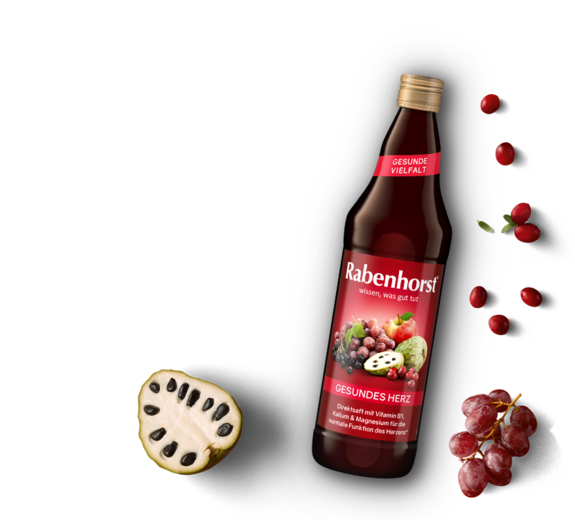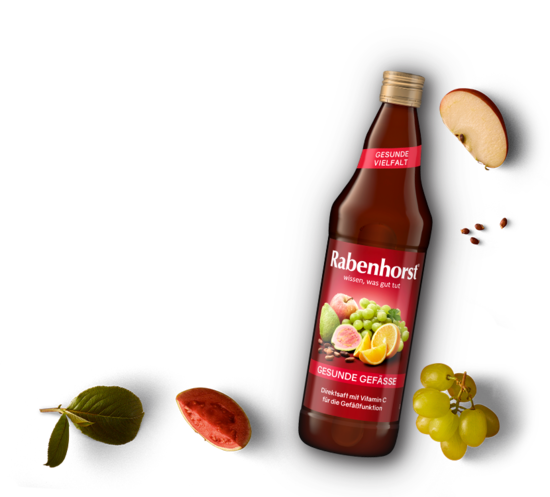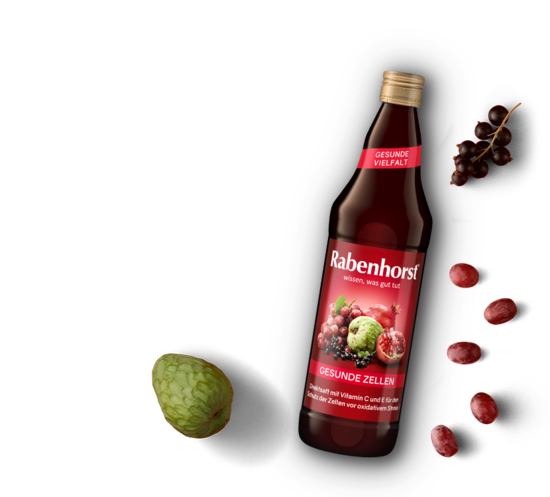For a healthy heart
Like a high-performance engine, our heart performs at its best every day. The Rabenhorst juice Healthy Heart supports the normal function of the heart. We produce a very special fruit juice of the highest quality from five valuable fruits, supplemented with vitamin B1, potassium and magnesium to support heart health.
Vitamin B1 contributes to a normal function of the heart. Moreover, potassium and magnesium contribute to the normal function of the muscles, including the normal function of the heart muscle. In addition, potassium contributes to the maintenance of normal blood pressure.
Nutritional values of our multi-fruit juice For a Healthy Heart

| Energy: | 230KJ (55kcal) |
|---|---|
| Fat: | < 0,5g |
| of which saturates: | < 0,1g |
| Carbohydrate: | 13g |
| of which sugars: | 13g |
| Fibre: | < 0,5g |
| Protein: | < 0,5g |
| Salt: | 0,03g |
| Magnesium: | 56 mg/15%* |
| Potassium: | 300 mg/15%* |
| Vitamin B1: | 1,1mg/100%* |
Ingredients:
Apple juice, grape juice, aronia juice, apple puree, cherimoya puree, cranberry juice, potassium citrate, magnesium citrate, vitamin B1, hawthorn berry extract (4:1)
Content:
Without added sugar, in accordance with the law. Fruit juice naturally contains the fruit's own sugar.
Hints and tips for the consumption of For a Healthy Heart
We recommend a balanced and varied diet and a healthy lifestyle. A daily portion of 150 ml covers the reference amount of potassium by 23 % and magnesium by 22 % and vitamin B1 by 150% and contains 100 mg hawthorn berry extract.
Frequently asked questions
What fruits does the pure juice For a Healthy Heart by Rabenhorst contain?
The aromatic fruit juice made from apples and white grapes also contains the exotic cherimoya as well as fruity aronia berries and cranberries. The healthy multi-fruit juice is completed by the addition of the minerals potassium, magnesium and vitamin B1 as well as the extract of hawthorn berries.
Which foods are sources of potassium?
A balanced and varied diet provides the body with sufficient potassium. However, if you want to actively consume potassium, you can eat foods that are rich in potassium. For example, dried apricots, peaches, dates, figs, plums, soybeans, peas, lentils as well as sultanas, white beans, fennel, soy, wheat bran and pistachios contain particularly high amounts of potassium.
Why are potassium, magnesium and vitamin b1 so important for the heart?
Vitamin B1 contributes to the normal function of the heart. Moreover, potassium and magnesium contribute to a normal function of the muscles, including the normal function of the heart muscle. In addition, potassium contributes to the maintenance of normal blood pressure.
How much potassium does an adult need daily?
The European Union's recommended daily intake of potassium is 2,000 mg. This Nutrient Reference Value (NRV) indicates the amount of potassium a normal-weight adult should consume daily to meet their average needs.
Which foods are sources of vitamin B1?
The body can only store small amounts of vitamin B1, also known as thiamine. Therefore, people must regularly consume it with their food for a sufficient supply. Vitamin B1 is found in red meat, especially pork, liver, certain types of fish such as plaice and eel, wholegrain products such as oats or wholemeal flour, wheat germ, seeds such as sunflower seeds or pine nuts, and legumes such as peas, mung beans or peanuts.
How much Vitamin B1 does an adult need daily?
The European Union's recommended daily intake of vitamin B1 is 1.1 mg. This Nutrient Reference Value (NRV) indicates the amount of vitamin B1 a normal-weight adult should consume daily to meet their average needs.



